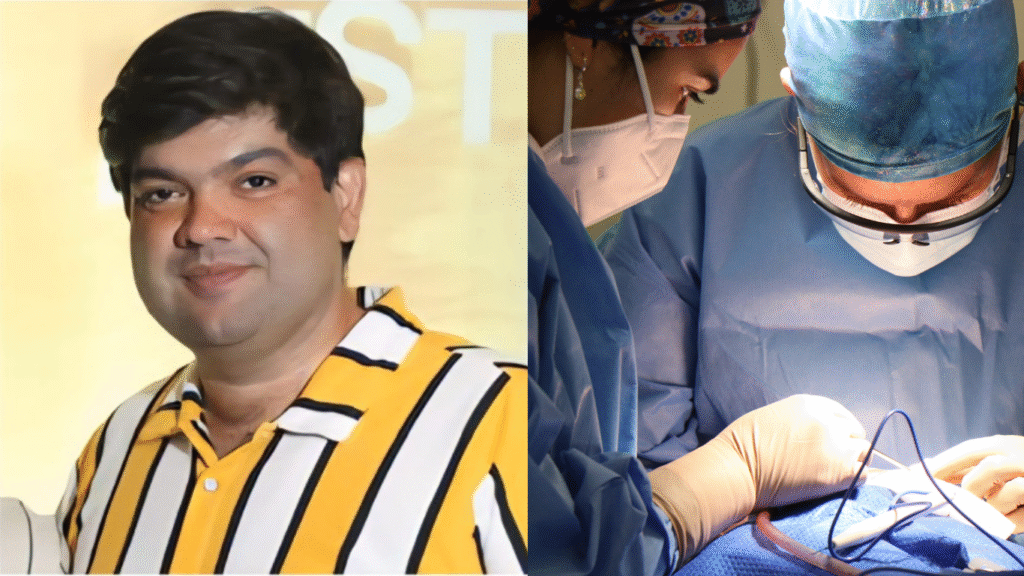The death of Ujjwal Chaudhary at Yashoda Hospital in Ghaziabad has sparked outrage and raised serious questions about the hospital’s practices. Families trust hospitals to save lives, but when negligence leads to tragedy, that trust is shattered. Ujjwal’s case is not an isolated incident at Yashoda Hospital, which has faced multiple allegations of medical negligence over the years. This article dives into Ujjwal’s story, explores past cases of negligence at Yashoda, and examines why accountability seems elusive, including the influence of powerful figures behind the hospital.
Ujjwal Chaudhary’s Tragic Story
Ujjwal Chaudhary, a young man from Muzaffarnagar, Uttar Pradesh, went to Yashoda Super Speciality Hospital in Kaushambi, Ghaziabad, for a routine hernia operation. His family expected a straightforward procedure using advanced robotic surgery. Instead, what unfolded was a nightmare. During the surgery, his intestine was reportedly cut, leading to severe complications. A second operation was performed to address the issue, but an infection set in, and Ujjwal’s condition worsened rapidly. Despite the efforts, he passed away, leaving his family devastated. They accused the hospital of negligence, claiming the doctors mishandled the surgery and failed to manage the infection properly. The family staged a protest outside the hospital, demanding an FIR (First Information Report) against the doctors and hospital management. Social media posts on X amplified their cries for justice, with users sharing details of the incident and calling for accountability. The tragedy has put Yashoda Hospital under scrutiny, raising questions about its standards and care.
A Pattern of Negligence at Yashoda Hospital
Yashoda Hospital, a prominent name in North India’s healthcare sector, has faced repeated allegations of negligence. Ujjwal’s case echoes a troubling pattern of incidents where patients suffered due to alleged errors or mismanagement. Families have consistently reported issues like botched surgeries, overbilling, and lack of transparency. Despite these complaints, the hospital often avoids severe consequences, leaving grieving families with little justice. Below are some notable cases that highlight this recurring problem at Yashoda’s facilities, particularly in Ghaziabad and Hyderabad.
The Case of Savita Sharma
In February 2024, Savita Sharma, a 77-year-old woman, was admitted to Yashoda Superspeciality Hospital in Sanjay Nagar, Ghaziabad, for a stomach ulcer. Her husband, Vijay Kumar Sharma, alleged that the hospital’s negligence led to her death. After a failed surgery, Savita developed a biliary leakage, requiring a second operation. Despite this, her condition deteriorated, and she passed away on February 14, 2024. Vijay claimed the hospital charged exorbitant fees—nearly double the initial estimate—and failed to respond to his complaints. He wrote to the Prime Minister and other authorities, but the case moved slowly, with no significant action against the hospital. This case mirrors Ujjwal’s, where surgical errors and poor follow-up care led to tragedy.
Yeshvir Singh Tyagi’s Struggle
In 2016, Yeshvir Singh Tyagi, a retired Indian Air Force sergeant, was admitted to Yashoda Hospital in Kaushambi. His son, Amit Tyagi, alleged that the hospital denied cashless treatment under the Ex-servicemen Contributory Health Scheme (ECHS) and forced the family to buy medical items from the hospital’s pharmacy. Yeshvir passed away, and the family filed an FIR against three doctors for cheating and extortion. Despite the serious allegations, no arrests were made, and the investigation dragged on. The hospital claimed the expenses were minor and non-admissible, but the lack of accountability frustrated the family. This case highlights how Yashoda’s practices often burden families financially while failing to deliver proper care.
Annem Ramya’s Billing Controversy
In October 2022, 20-year-old Annem Ramya died of dengue at Yashoda Hospital’s Malakpet branch in Hyderabad. Her father, Satyanarayana Reddy, discovered that the hospital issued bills for October 15, a day after her death. The family accused the hospital of exploiting their loss by charging for services not provided. Yashoda’s management later clarified that the billing was for medications given before her death, delayed due to administrative processes. However, the incident fueled distrust, with activists like Bakka Judson criticizing corporate hospitals for prioritizing profits over patient care. This case underscores Yashoda’s questionable billing practices, which often add insult to injury for grieving families.
D. Uma Devi’s Fight for Justice
In 2009, a patient at Yashoda Hospital in Hyderabad suffered a cardiac arrest during an ERCP procedure, leading to a coma and eventual death in 2010. The patient’s wife, D. Uma Devi, filed a complaint with the National Consumer Disputes Redressal Commission, alleging negligence. The commission found that the hospital failed to follow standard guidelines for administering Propofol, a sedative, and mismanaged the cardiac arrest. The lack of medical records for a critical 20-minute period further pointed to negligence. Despite these findings, the hospital faced minimal repercussions, and the family endured a long legal battle. This case reveals systemic issues in Yashoda’s medical protocols and record-keeping.
Why Accountability Remains Elusive
Despite multiple allegations, Yashoda Hospital rarely faces significant punishment. Several factors contribute to this lack of accountability, from slow legal processes to the hospital’s influence in the healthcare industry. Families like Ujjwal’s often find themselves fighting a system that seems stacked against them.
Slow Legal and Regulatory Processes
One major reason Yashoda avoids severe consequences is the slow pace of India’s legal and medical regulatory systems. In Ujjwal’s case, the family demanded an FIR, but as of June 2025, no significant action has been reported. Similarly, Vijay Kumar Sharma’s complaints about his wife’s death in 2024 led to a medical board investigation, but progress was sluggish. The case of D. Uma Devi took years to reach a conclusion, with minimal impact on the hospital. The Telangana High Court’s 2024 ruling on a complaint against Yashoda for improper thyroid treatment also highlighted arbitrary case closures by authorities. These delays and dismissals discourage families from pursuing justice, allowing hospitals to evade accountability.
Financial and Political Influence
Yashoda Hospital’s financial clout and alleged political connections make it difficult to hold them accountable. The hospital chain, particularly Yashoda Super Speciality Hospitals, has been linked to significant electoral bond donations, with reports indicating Rs 162 crore donated between 2021 and 2023. While the hospital denied direct involvement, the donations raised questions about their influence. In 2016, a press conference by then-Union Defence Minister Manohar Parrikar was held at the home of Dinesh Arora, a key figure behind Yashoda’s Ghaziabad branches. Dinesh Arora’s association with the Rashtriya Swayamsevak Sangh (RSS) further suggests ties to powerful networks. These connections may shield the hospital from rigorous scrutiny, as authorities hesitate to act against influential institutions.
The Role of “Godfathers”
The “godfathers” of Yashoda Hospital are often cited as its founders and key stakeholders, including Dr. Dinesh Arora and P.N. Arora, who split management of the Ghaziabad branches in 2017. Despite their separation, both maintain significant control over the hospital’s operations. Dinesh Arora’s son, Rajat, now manages the Sanjay Nagar and Nehru Nagar branches, while P.N. Arora oversees the Kaushambi facility. Their wealth and investments, such as the Rs 500 crore Yashoda Medicity project, demonstrate their financial power. Additionally, their ties to political figures and organizations like the RSS give them leverage, making it challenging for authorities to impose strict penalties. This influence often leaves families like Ujjwal’s feeling powerless against a well-connected institution.
The Broader Impact on Trust in Healthcare
The repeated negligence cases at Yashoda Hospital erode public trust in private healthcare. Families expect care and compassion but are often met with high costs and questionable practices. Ujjwal Chaudhary’s death, like those of Savita Sharma, Yeshvir Tyagi, and others, highlights the need for stricter oversight. Social media posts on X reflect public frustration, with users demanding justice and accountability. These incidents also raise questions about the regulation of robotic surgeries and other advanced procedures, which require skilled professionals and rigorous protocols.
Calls for Reform
The tragedies at Yashoda underscore the need for healthcare reform in India. Families and activists are pushing for faster investigations, transparent billing, and stricter penalties for negligence. In Ujjwal’s case, the family’s protest and social media outcry show a growing demand for change. Strengthening medical boards, enforcing clear guidelines for surgeries, and ensuring hospitals cannot exploit patients financially are critical steps. Without these reforms, trust in hospitals like Yashoda will continue to erode, leaving more families in pain.
The Role of Public Awareness
Public awareness is key to holding hospitals accountable. Social media platforms like X have amplified cases like Ujjwal’s, putting pressure on authorities to act. Families are increasingly sharing their stories online, which helps highlight systemic issues. However, awareness alone isn’t enough—legal and regulatory systems must catch up. Encouraging patients to demand transparency and report negligence can drive change, but it requires support from authorities to ensure justice is served.
Moving Forward: Justice for Ujjwal and Others
Ujjwal Chaudhary’s death is a heartbreaking reminder of the risks patients face in trusted hospitals. Yashoda’s history of negligence, from Savita Sharma to Annem Ramya, shows a pattern that cannot be ignored. The slow legal system and the hospital’s powerful backers make justice difficult, but families continue to fight. Ujjwal’s loved ones, like many before them, deserve answers and accountability. As public outrage grows, it’s time for stricter regulations and transparency to ensure no more lives are lost to negligence. The healthcare system must prioritize patients over profits, and hospitals like Yashoda must be held to higher standards.



